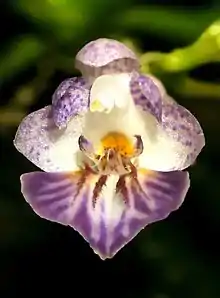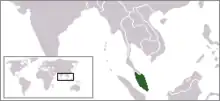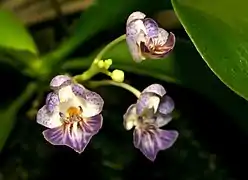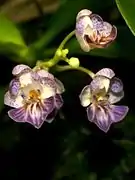| Phalaenopsis appendiculata | |
|---|---|
 | |
| Flower detail | |
| Scientific classification | |
| Kingdom: | Plantae |
| Clade: | Tracheophytes |
| Clade: | Angiosperms |
| Clade: | Monocots |
| Order: | Asparagales |
| Family: | Orchidaceae |
| Subfamily: | Epidendroideae |
| Genus: | Phalaenopsis |
| Species: | P. appendiculata |
| Binomial name | |
| Phalaenopsis appendiculata Carr[2] | |
 | |
| distribution of Phalaenopsis appendiculata | |
| Synonyms[2] | |
| |
Phalaenopsis appendiculata is a species of miniature epiphyte in the family Orchidaceae, endemic to peninsular Malaysia.[2]
Description
This species grows on narrow branches. The very short stems bear two to four, elliptic or oblong-elliptic, coriaceous leaves, which may reach up to 7 cm in length and 3.5 cm in width. Spotted, violet flowers are produced in succession on short, few-flowered, suberect racemes. The specific epithet appendiculata refers to the longitudinal rows of appendages on the three-lobed labellum.[3]
Conservation
Artificial asymbiotic seed germination techniques have been studied.[4] Conservation efforts can benefit from artificial propagation of rare and endangered species.[5] Both ex situ and in situ conservation can benefit from in vitro seed germination, as the process increases adaptive evolutionary changes and as a result there is more genetic variation in reintroduced populations.[6]
References
- ↑ Phalaenopsis appendiculata| CITES. (n.d.). Convention on International Trade in Endangered Species of Wild Fauna and Flora. Retrieved May 7, 2022, from https://cites.org/eng/taxonomy/term/33588
- 1 2 3 "Phalaenopsis appendiculata Carr | Plants of the World Online | Kew Science". powo.science.kew.org. Retrieved 14 February 2022.
- ↑ Christenson, E. A. (2001). Phalaenopsis: a monograph. Timber Press (OR).
- ↑ Lee, Y. I., Chen, M. C., & Huang, C. Y. (2010, January). Effect of medium composition on asymbiotic seed germination of five Phalaenopsis species. In I International Orchid Symposium 878 (pp. 225-230).
- ↑ Gogoi, K., Kumaria, S. & Tandon, P. Ex situ conservation of Cymbidium eburneum Lindl.: a threatened and vulnerable orchid, by asymbiotic seed germination. 3 Biotech 2, 337–343 (2012). https://doi.org/10.1007/s13205-012-0062-8
- ↑ Tandon P, Kumaria S (2005) Prospects of plant conservation biotechnology in India with special reference to Northeastern region. In: Tandon P, Sharma M, Swarup R (eds) Biodiversity: status and prospects. Narosa Publishing House, New Delhi, pp 79–92

